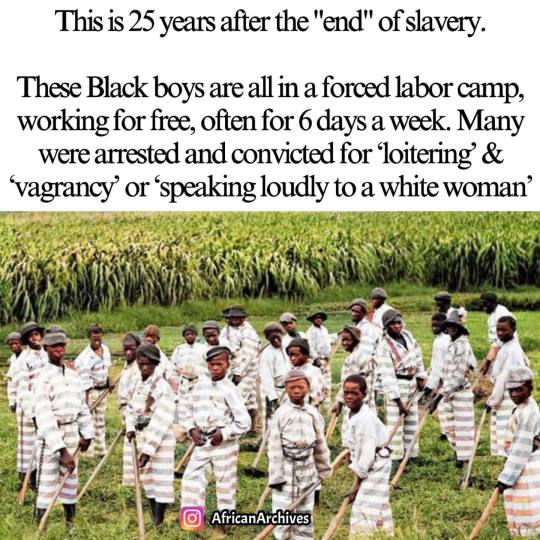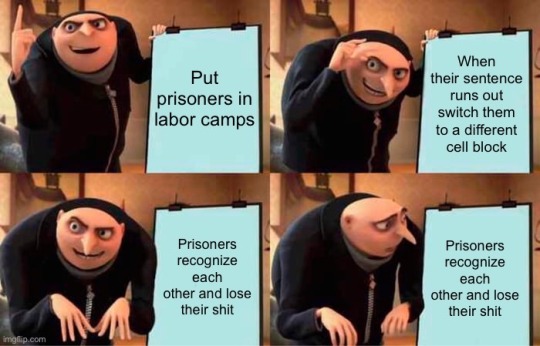#prison labor
Text
UPDATE: turning off reblogs since voting is over for this cycle
this is absolutely not a "go vote or you're evil!" post BUT you should know that if you're registered to vote in Oregon, Alabama, Louisiana, Tennessee, or Vermont you have the opportunity to vote to abolish prison slavery this year, and i think you should strongly consider it.
from the washington post:
"The 13th Amendment of the U.S. Constitution bans slavery or involuntary servitude, except when it is used as punishment for a crime.
If passed, the proposals would wholly abolish slavery in those states, though they would not automatically change protocols on prison labor or inmate pay.
[...] the bills could give lawyers more license to pursue greater rights and higher pay for U.S. prisoners; Dolovich said that paying inmates below the minimum-wage protections set by each state is arguably 'a species of slavery.'
'It’ll be a fight in court. This question will be manifested by lawyers bringing cases on behalf of incarcerated workers,' she said. 'It’s a hopeful sign for me.'"
(Source; warning for more detailed discussion of prison slavery and related cruelty in the article)
so again, if you're able to vote and live in Oregon, Alabama, Louisiana, Tennessee, or Vermont, please consider it. prison abolition will not happen solely via voting it away but if these pass it will certainly be a victory and hopefully a stepping stone for other victories.
#prison abolition#prison labor#slavery#upload#edit: you know what you're right. i'll slap a tag on here for non usamericans#us centric#incarceration#antiblackness
6K notes
·
View notes
Text

In 1865, enslaved people in Texas were notified by Union Civil War soldiers about the abolition of slavery. This was 2.5 years after the final Emancipation Proclamation which freed all enslaved Black Americans.
But Slavery Continued… In 1866, a year after the amendment was ratified, Alabama, Texas, Louisiana, Arkansas, Georgia, Mississippi, Florida, Tennessee, and South Carolina began to lease out convicts for labor.
This made the business of arresting black people very lucrative, thus hundreds of white men were hired by these states as police officers.
Their primary responsibility being to search out and arrest black peoples who were in violation of ‘Black Codes’
Basically, black codes were a series of laws criminalizing legal activity for black people. Through the enforcement of these laws, they could be imprisoned.
Once arrested, these men, women & children would be leased to plantations or they would be leased to work at coal mines, or railroad companies. The owners of these businesses would pay the state for every prisoner who worked for them; prison labor.
It’s believed that after the passing of the 13th Amendment, more than 800,000 Black people were part of that system of re-enslavement through the prison system.
The 13th Amendment declared that "Neither slavery nor involuntary servitude, except as a punishment for crime whereof the party shall have been duly convicted, shall exist within the United States, or any place subject to their jurisdiction."
Lawmakers used this phrase to make petty offenses crimes. When Blacks were found guilty of committing these crimes, they were imprisoned and then leased out to the same businesses that lost slaves after the passing of the 13th Amendment.
The majority of White Southern farmers and business owners hated the 13th Amendment because it took away slave labor. As a way to appease them, the federal government turned a blind eye when southern states used this clause in the 13th Amendment to establish the Black Codes.
#slavery#emancipation proclamation#black americans#convict leasing#black codes#13th amendment#involuntary servitude#prison labor#re-enslavement#southern states#racial discrimination
399 notes
·
View notes
Text
""That's right, pal," says Number Seven. "And take it in these shops. If they'd even teach a guy a trade - make him learn a trade you wouldn't mind. Then a guy would have something to fall back on if he felt like hitting the straight and narrow. But what do they do? They put you to work making automobile plates, or something that's only done in prisons; stuff you couldn't get a job at outside if you wanted to; and the machinery is all twenty years out of date; and the instructors don't know anything about up-to-date methods; and the materials you get to work with are so lousy that you can't learn to do decent work even if you want to. Here I am. I've been working in the shoeshop for five years. What good will that do me? In the first place, the work I'm doing is done by women and children outside; it don't pay any- thing; and if I tried to get away with the lousy kind of work I've been taught to do, I wouldn't last two hours in an outside shop. The print shop is the only shop in here where a guy could learn a decent trade; but Christ, there's only room for forty guys in that shop, and you have to be a high-school graduate to get in there. That don't do the rest of us any good. There's a thousand men here, and only room for forty or so over in the print shop. And not only that, but So-and-So was always threatening to close the print shop because it didn't show enough profits. That's all they think about here. They damn about us learning a trade; all they is having the industries show a profit!"
"And take a guy when he gets out of here," says Number Ten. "Times are lousy outside. Even guys who know their trades, guys that can get swell references, can't get a job nowadays. And if they can't get work, how in the name of Christ are we going to get it even if we want it? And the jobs you can get don't pay anything - not enough to live on. A guy might better be in here than out there starving to death. How the hell is a guy going to live on twenty-five or thirty bucks a week, especially if he's married?"
- Victor F. Nelson, Prison Days and Nights. Second edition. With an introduction by Abraham Myerson, M.D. Garden City: Garden City Publishing Co., 1936. p. 213-214.
#words from the inside#prisoner autobiography#prison industries#released from prison#prison labor#failure of rehabilitation#american prison system#prison routine#prison days and nights#victor nelson#history of crime and punishment#convict labour#reading 2024
72 notes
·
View notes
Video
Cop city in Atlanta
https://www.transitionus.org
https://defendtheatlantaforest.org/
http://www.savetheoldatlantaprisonfarm.org/
#tiktok#cop city atlanta#cop city#atlanta#Georgia#USA#police violence#police brutality#police abolition#climate crisis#floods#water pollution#climate change#inequality#income inequality#wealth inequality#chattel slavery#prison labor#prison abolition#prison#forest preserve#forests#collective action#protests
348 notes
·
View notes
Text
So I was just thinking about Aaron Bushnell, and how the piece of that story that I just cannot get over is the one first responder yelling, "I don't need guns, I need fire extinguishers," and how if you made a movie and you intercut the scene of the police drawing guns on a burning and dying man, with shots of bombs falling and weapons pointed at the burning and dying city, and had someone yell that, it would be a little too on the nose, but it happened
and then I scrolled down a bit and there was this post about a prisoner in the US donating to relief efforts in Gaza the entire proceeds of 136 hours of prison labor, which came to $17.74
And I don't really have a fully-articulated point, but something about and how that, that is the problem with both American policing and America's response to the crisis in Gaza, that we are bringing guns to situations that need fire extinguishers,
and $17.74 will just about buy a fire extinguisher.
53 notes
·
View notes
Text




Scott Eastwood : Mercury Plains (2016)
#scott eastwood#mercury plains#shirtless#sweaty#chain gang#scotteastwood#mercuryplains#the longest ride#thelongestride#clint eastwood#clinteastwood#overdrive#gran torino#grantorino#chaingang#prison labor#prison labour#prisonlabor#prisonlabour#prison#prisoner#shirtless workmen#shirtless hunk#shirtless actor
110 notes
·
View notes
Text
Voters in three states approved ballot measures that will change their state constitutions to prohibit slavery and involuntary servitude as punishment for crime, while those in a fourth state rejected the move. The measures approved Tuesday curtail the use of prison labor in Alabama, Tennessee and Vermont. In Oregon, “yes” was leading its anti-slavery ballot initiative, but the vote remained too early to call Wednesday morning.
In Louisiana, a former slave-holding state, voters rejected a ballot question known as Amendment 7 that asked whether they supported a constitutional amendment to prohibit the use of involuntary servitude in the criminal justice system.
The initiatives won’t force immediate changes in the states’ prisons, but they may invite legal challenges over the practice of coercing prisoners to work under threat of sanctions or loss of privileges if they refuse the work.
The results were celebrated among anti-slavery advocates, including those pushing to further amend the U.S. Constitution, which prohibits enslavement and involuntary servitude except as a form of criminal punishment. More than 150 years after enslaved Africans and their descendants were released from bondage through ratification of the 13th Amendment, the slavery exception continues to permit the exploitation of low-cost labor by incarcerated individuals.
“Voters in Oregon and other states have come together across party lines to say that this stain must be removed from state constitutions,” Oregon Sen. Jeff Merkley, a Democrat, told The Associated Press.
“Now, it is time for all Americans to come together and say that it must be struck from the U.S. Constitution. There should be no exceptions to a ban on slavery,” he said.
Coinciding with the creation of the Juneteenth federal holiday last year, Merkley and Rep. Nikema Williams, D-Georgia, reintroduced legislation to revise the 13th Amendment to end the slavery exception. If it wins approval in Congress, the constitutional amendment must be ratified by three-fourths of U.S. states.
After Tuesday’s vote, more than a dozen states still have constitutions that include language permitting slavery and involuntary servitude for prisoners. Several other states have no constitutional language for or against the use of forced prison labor.
Voters in Colorado became the first to approve removal of slavery exception language from the state constitution in 2018, followed by Nebraska and Utah two years later.
The movement to end or regulate the use of prison labor has existed for decades, since the time when former Confederate states sought ways to maintain the use of chattel slavery after the Civil War. Southern states used racist laws, referred to as “Black codes,” to criminalize, imprison and re-enslave Black Americans over benign behavior.
Today, prison labor is a multibillion-dollar practice. By comparison, workers can make pennies on the dollar. And prisoners who refuse to work can be denied privileges such as phone calls and visits with family, as well as face solitary confinement, all punishments that are eerily similar to those used during antebellum slavery.
“The 13th Amendment didn’t actually abolish slavery — what it did was make it invisible,” Bianca Tylek, an anti-slavery advocate and the executive director of the criminal justice advocacy group Worth Rises, told the AP in an interview ahead of Election Day.
She said passage of the ballot initiatives, especially in red states like Alabama, “is a great signal for what’s possible at the federal level.”
“There is a big opportunity here, in this moment,” Tylek said.
#us politics#news#ap news#associated press#nbc news#abolish slavery#slavery#american slavery#slavery didn’t get abolished it just got modernised#prison labor#Alabama#tennessee#Vermont#Oregon#us constitution#13th amendment#Sen. Jeff Merkley#Rep. Nikema Williams#2022 midterms#2022 elections#2022
222 notes
·
View notes
Text
Prisoners in the US are part of a hidden workforce linked to hundreds of popular food brands | AP News
https://apnews.com/article/prison-to-plate-inmate-labor-investigation-c6f0eb4747963283316e494eadf08c4e
13 notes
·
View notes
Text
#tiktok#more perfect union#tw slavery#slavery#modern slavery#prison#incarcerated people#incarceration#capitalism#late stage capitalism#capitalism kills#modern day slavery#prison labor
7 notes
·
View notes
Text
Apps that help you make more informed decisions when shopping:
Buycott
Buycott allows you to select campaigns you care about/ things you want to avoid (e.g, chocolate produced w/o child labor, Palm oil, nestle, human trafficking, prison slave labor, Koch industries, union-made, etc), then when you scan a barcode of a product, it will tell you if the company supports or conflicts with causes you care about
Android
Apple

Beat the Microbead
The Beat the Microbead app allows you to scan the ingredients on packaging to see if your product contains microplastics. You will immediately see if the scanned product contains microplastics and, if so, which ones.
Apple
Android
Ingredient scan results for Neutrogena oil-free acne wash

#environment#microplastics#union made#fair trade#koch brothers#climate change#ethicalskincare#ethicalbrand#prison labor#boycott#palestine#vegetarian#cruelty free#capitalism#informed consent#ecofriendly#microbeads#plastic#income inequality#neutrogena#garnier
194 notes
·
View notes
Text
Happy Juneteenth everyone; a reminder that slavery is still legal in most of the United States. Quoting from the 13th Amendment (emphasis mine):
Section 1.
Neither slavery nor involuntary servitude, except as a punishment for crime whereof the party shall have been duly convicted, shall exist within the United States, or any place subject to their jurisdiction.
This was explicitly used against former slaves in the years after the 13th Amendment was passed. Invent a crime, charge Black people with it, sentence them to labor camps. Voila, slaves. [Search term: "Black Codes"]
Things have changed since then... slightly. The rules vary from state to state, but in general, "paid" prisoner labor is available for less than $1/hour, and that's before the prison deducts "costs" for room and board or administering the "employment" system. Prisons, meanwhile, reap the benefit of over $2000 per year per inmate in tax credits. You do the math. [Search term: "Penal labor"]
There has been some recent progress: several states have closed the loophole by amending their state constitutions, and there is a constitutional amendment kicking around Congress called "the Abolition Amendment" that would close it at the federal level. [Search term: "Abolition Amendment"]
The links above are to individual sources that I think do a good job of describing the situation. I highly recommend you do your own research on this, by plugging those terms into your favorite search engine. ("13th Amendment loophole" is also a good one.)
16 notes
·
View notes
Note
Do you think we should ban prison labour? Because prisoners get paid horribly low wages. Or maybe make a mandatory prison labour wage like 15 dollars a hour. But then again abolishing prison would be better, because then there would no enslavement of prisoners and no rape and torture of prisoners and lots of jobs created.
I don't think we should have prisons at all, but for as long as we do have them, working while incarcerated should be optional and subject to the same workers rights regulations as working while not incarcerated.
the end goal is to abolish the prison system, but in the meantime working while in prison should be a choice, said workers should have a union, make a living wage, and have legally mandated breaks and shifts no longer than 8 hours. I want them to make time and a half on holidays and get overtime pay if they work extra hours. I want the same rights for incarcerated workers as I want for unincarcerated workers. that's the bare minimum. ideally, workers (whether incarcerated or not) should have much higher pay, maximum 6 hour shifts, and a 4 day work week, any more than 24 hours of work in week meaning overtime pay
ideally, prison labour reform would only need to be temporary. that is only to make the lives of incarcerated people a little bit more livable until we can dismantle the prison system and restore freedom to those who have been imprisoned by an oppressive government, just as the workers rights that I want are largely related to a capitalist system that I believe should also be dismantled
the reason I push for reform as well as abolition is that if abolition takes a long time to put in place, incarcerated people should have more rights in the meantime. the same way that I want an end to capitalism, but in the meantime I want higher wages and a lower cost of living.
#mine#asks#anonymous#workers rights#incarceration#prison#abolish prisons#prison abolition#prison labor#prison labour#capitalism
50 notes
·
View notes
Text
youtube
In a sweeping two-year investigation, The Associated Press found U.S. prison labor tied to hundreds of popular food brands. The goods end up on the shelves of most supermarkets and are also exported.
Read the full story here: https://bit.ly/42jJTSz
#article#video#youtube#associated press#prison labor#prison#capitalism is a scam#workers#labor#slavery#human rights#Youtube
9 notes
·
View notes
Text
"In straggling, disorderly ranks we would march to the shops: the shoe shop, the print shop, the plate shop: whatever shop it might happen to be...
Some of us might wonder about the values involved. What about trades? Who the hell wants to be a shoemaker when he gets out? Where can you find a job making automobile plates in the free world, when they're all made in prison? This business of classification and segregation; they make us sleep in separate cell blocks, according to the provisions of some scheme they have in mind; but during the day, we're all thrown together in the shop. Classification versus profit-making! In a country whose predominant codes are personal aggrandizement and private enrichment what would the answer be?
I sit down at my machine in the tailor shop. I have never done any of this work before. I am naturally inept, having no mechanical skill whatever. "Paddy" comes along. He is the instructor. An Irishman. "Ah," he said, "ye're wan of me own kind." And throws a pile of work in front of me. Pants, overalls, shirts, whatnot. He tries to tell me a funny and obscene story. I don't feel like listening to it. I do not like him, knowing him to be a convict-hater at heart. My mind is on other things: grave things: the implications of imprisonment.
"Listen," I say, "you get to hell out of here, Paddy. If you have anything to say to me about the work, all right, say it. But the judge didn't say that I had to sit here and listen to your bum jokes. That wasn't in the sentence at all." Paddy very naturally resents my attitude, as I resent his. He feels, too, that in some way I am his superior. I have a certain intellectual dominance over him. He hates that, as I hate his brute power over me (if I do not complete my daily task, Paddy can have me sent to solitary confinement as a malingerer). It is a Mexican stand-off. He would like to punish me not because he cares very much about the work itself, but because he hates a certain overt and unconcealed superiority which I have taken great delight in making him aware of.
That is my revenge. But since I've actually kept myself apparently busy all day, although I have not completed the task, Paddy is powerless to punish me. That is, he cannot send me to the "block." He can, however, and does punish me in more effective ways. Whether or not I complete my task for the day, Paddy each morning throws a fresh bundle of work on my bench. This means that I shall never be caught up; that I shall never have a moment of leisure. Other men can complete their task during the morning and loaf the rest of the day. I simply have not the mechanical skill to cope with the daily task. Paddy, therefore, wins. In spite of what I feel is my superiority, I cannot score off Paddy. He is brute stupidity rampant and successful. He is prison work.
It is noontime. The hateful shop morning is ended. We march to our cells for the noon meal and an hour of rest. Rest!
How rest the tired, rebellious, imprisoned mind? One cannot rest. One can merely escape from the existing drabness. One can merely lie down on the bed and drift off into the dream world; into memories of the past, visions of the future; neither of which is satisfactory except in retrospect or anticipation. One lies in a stupor, shutting out the undignified, unappetizing dullness; deliberately or unconsciously running away from life. This is a bad habit to get into, this flying from reality; but it is a habit into which practically all of us get, mildly or terribly, depending entirely on the length of our sentences, our ages, our intensities of awareness.
One o'clock. Back to work again. The same stuffy shops, the same tiresome work. It is absolute industrial masturbation! Merely working men in order to keep them busy, with no pride in the finished product, no care about inculcating habits of craftsmanship, no thought except to make us do something we don't like to do. The guards on their elevated benches become lazy-minded, unpremeditated sadists, and take a senseless delight in giving each man the job he most heartily hates to do. This comes from natural stupidity, prejudices racial and religious, and the fierce desire of the average man to savor power when he gets a chance to use it. Lo, the poor guard! In his mind's eye he can see us as we were in the free world; with money, ravishing women, all the sensual delights which must be forever unattainable to him. We have had this. He has never had it, never will have it. Therefore, enviously, gloatingly, he exacts vengeance upon us for the unalterable deficiencies in his own life.
Work, work, work; day in and day out; hateful, stupefying work, to which we bring nothing but resentment and from which we take nothing but hatred. Thus we spend eight hours each day one third of our lives. We read the prison books: Tully, Lowry, Maynard, Booth, John Boyle O'Reilly, Jack London, Ed Morrell, Al Jennings; but especially Jim Tully. One finds in them nothing but excitement, glamour, danger, brilliance. (Tasker's "Grimhaven," however, is a fine piece of work.) Well, not nothing but excitement; but at any rate chiefly excitement. We know that nothing could be further from the truth. Day after day we find that proneness, inertia, stolidity, weariness and dejection are the prevailing qualities of our lives. The escapes and murders - the exciting things are so infrequent as to be practically nonexistent. Every minute of the day, all the year round, the most dominant tone is one of monotony.
Four o'clock. Yard time. Recreation. We go from the stuffy shop to the colorless yard. In it is no blade of grass, no tree, no bit of freshness or brilliance. Gray walls, dusty gravel, dirt and asphalt hardness.
We walk about, or during our first few months or years manage to throw a ball back and forth and in some degree exercise our bodies. The longer we stay here, the less we do. At last we merely walk at a funeral pace, or lean against a wall and talk.
We always talk. During the working hours, but even more so during the cell hours, we store up facts, reflections, broodings, so that our minds are overflowing. And every chance we get to unburden them, we avail ourselves of it. We talk at each other. We do not converse; we deliver monologues in which we get rid of the stored-up bubblings. We try to live through words and self-dramatization. Our essential need is for actual tangible living, which we cannot have; so we try to live by pretending to live in tall stories based on how we'd like to live, how we long to live.
Four-thirty. Yard time is over. We march to our cells, taking with us the evening meal. The shop has been so enervating, so weakening, so downright devitalizing, that we are glad to go to our cells. We think, "Well, here's another day done. Another day nearer home. God, but it's good to get back to the cell!" In our hearts, however, we know that the cell is even worse than the shop; and that in the morning we'll be saying, "God, but it's good to get out of that damned cell!""
- Victor F. Nelson, Prison Days and Nights. Second edition. With an introduction by Abraham Myerson, M.D. Garden City: Garden City Publishing Co., 1936. p. 12-16
#words from the inside#prisoner autobiography#life inside#prison labor#prisons#american prison system#prison routine#prison days and nights#victor nelson#history of crime and punishment#convict labour#reading 2024
3 notes
·
View notes
Text



Andor ep. 9
#somehow this show keeps getting better and better#andor#andor show#cassian andor#prison labor#labor camps#fascism#Star Wars#lilly rants
65 notes
·
View notes
